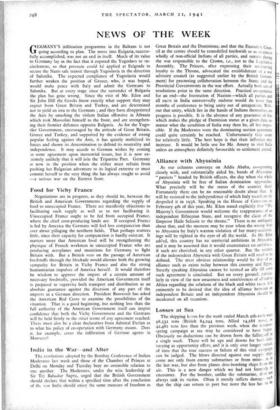India in the War—and After
The resolutions adopted by the Bombay Conference of Indian Moderates last week and those of the Chamber of Princes at Delhi on Monday and Tuesday bear no ostensible relation to one another. The Moderates, under the wise leadership of Sir Tej Bahadur Sapru, urged that the British Government should declare that within a specified time after the conclusion of the war India should enjoy the same measure of freedom as Great Britain and the Dominions, and that the Executive CAmn_ cil at the centre should be remodelled forthwith so as to consist wholly of non-official Indians of all parties, and remain during the war responsible to the Crown, i.e., not to the Legislative Assembly. The Princes, after expressing their unswerving loyalty to the Throne, advocated the establishment of a war advisory council (as suggested earlier by the British Govern- ment) for promoting collaboration between the States and the Provincial Governments in the war effort. Actually both sets of resolutions point in the same direction. Practical co-operation for an end—the frustration of Nazism—which all parties and all races in India unreservedly endorse would do more than months of conference to bring unity out of antagonism. With- out that unity, which lies in the hands of Indians themselves, no progress is possible. It is the absence of any guarantee of that which makes the pledge of Dominion status at a given date, no matter what the condition of India may then be, all but impos- sible. If the Moderates were the dominating section agreement could quite certainly be reached. Unfortunately they count for relatively little. The best hope is that their influence may increase. It would be little use for Mr. Amery to visit India unless an atmosphere definitely favourable to settlement existed.






































 Previous page
Previous page